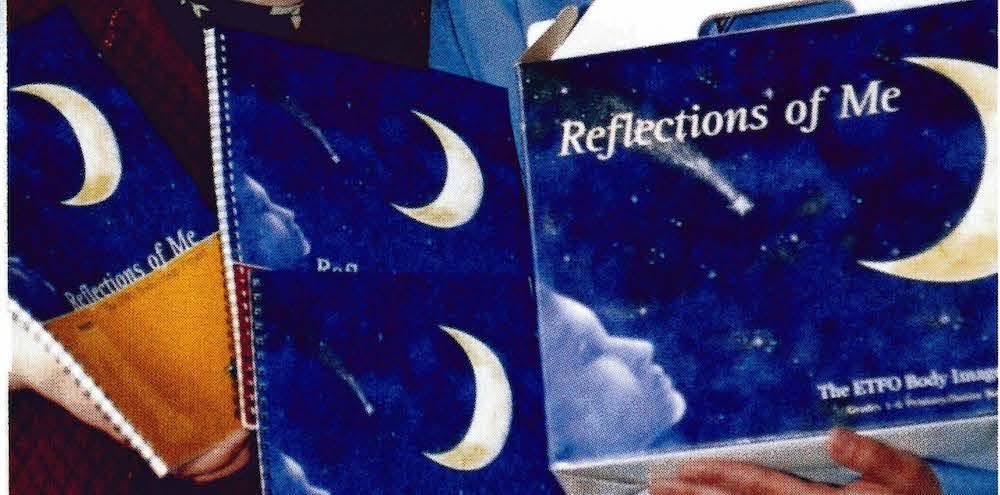
Reflections of Me: The ETFO Body Image Project
ETFO first learned from teachers that they had noticed an increasing incidence of weight preoccupation in students. This trend was reported in children as early as kindergarten. Teachers' observations, as well as the rapid increase in eating disorders throughout our society, made ETFO realize the need for a closer investigation of this issue.
In the spring of 2001, ETFO began to develop an extensive project designed to improve the quality of life for Ontario's children. Reflections of Me: The ETFO Body Image Project is the result.
Initially, ETFO brought together an advisory committee to discuss the negative images many girls have of their bodies, how this affects their wellbeing and what can be done about it.
Staff from ETFO's Professional Services Service Area asked representatives from the National Eating Disorder Information Centre, Sunnybrook and Women's College Hospital, the University of Toronto, and the Department of Public Health to sit on an advisory committee. The committee included a practising classroom teacher, a public health nurse, and a registered dietician.
As a result of recommendations from the panel, ETFO commissioned Dr. June Larkin, program director of the Equity Studies Centre, Institute for Women's Studies and Gender Studies at the University of Toronto, and Dr. Carla Rice, clinical program specialist with the Body Image Project at the Regional Women's Health Centre, Sunnybrook and Women's College Hospital, to research the issue. The study was to review the international literature on body image and recommend ways in which ETFO could address the issue.
In the fall of 2001, Larkin and Rice, working with researcher Maura Jette, delivered their extensive report on the developmental and socio-cultural factors that influence dissatisfaction with body image and eating problems in 4 to 14 year old girls. Although "body image" problems are generally taken to mean food and weight issues, the researchers also studied girls' concerns about shape, facial features, skin colour, and physical abilities. In addition, they looked at programs that had successfully promoted healthy body images in students.
As a result of that study, entitled Mainstreaming Body Equity, ETFO began developing a program to help girls feel good about their bodies. The program would include body-imagerelated curriculum for students from grades 1 to 8, teachers' guides, a video, and brochures for parents. Because the program would be based on a continuum of curriculum that could involve the whole school, it was decided to release all the components at the same time.
In October 2001, ETFO put out a call for writers for curriculum related to body image in girls in grades 1 to 3. Calls for junior and intermediate writers followed in 2002. Meanwhile, ETFO staff, along with filmmaker Gail Picco, began work on a video on body image to be used in all grades as well as with parents and other interested parties.
In keeping with the research findings, the curriculum fell into three program themes. The primary curriculum would focus on accepting diverse body images; the junior on promoting body acceptance and building resistance to body-based harassment; and the intermediate on questing adherence to body norms.
By the fall of 2003 Reflections of Me: The ETFO Body Image Project was nearing completion. All that remained to be done was to write a brochure for parents and teachers describing the issues, and to decide when the materials should be released. In the end, Wednesday, May 5 was selected, which coincided with International No Diet Day, set for May 6. A gala launch was planned to bring together, for the first time, all those who had worked on the project, representatives from the government and other education stakeholder groups, as well as members of the media.
The Art Gallery of Ontario was chosen as the site for the project launch. Its many images and sculptures of diverse bodies would provide a perfect backdrop for the message.
ETFO believes that Reflections of Me: The ETFO Body Image Project will be most effective when teachers from grades 1 -8 work together. Working alone, teachers can only achieve so much. Once students leave the classroom and interact with others on the playground and elsewhere, many of the messages they receive contradict the goals of the body image curriculum. Working together, as well as with parents and community members, teachers are more likely to succeed in promoting positive, enduring change in how students perceive their own bodies.
For more information on Reflections of Me: The ETFO Body Image Project, contact Jan Moxey at provincial office. E-mail: jmoxey@etfo.org. The brochure for parents is available at www.etfo.ca.